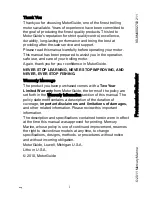
1-6
Chapter 1: Product Introduction
Chapter 1
Memory configurations
You may install 4GB, 8 GB, 16GB, and 32 GB unbuffered and non-ECC DDR4 DIMMs into
the DIMM sockets.
You may install varying memory sizes in Channel A and Channel B. The system maps
the total size of the lower-sized channel for the dual-channel configuration. Any excess
memory from the higher-sized channel is then mapped for single-channel operation.
•
The default memory operation frequency is dependent on its Serial Presence Detect
(SPD), which is the standard way of accessing information from a memory module.
Under the default state, some memory modules for overclocking may operate at a
lower frequency than the vendor-marked value.
•
For system stability, use a more efficient memory cooling system to support a full
memory load or overclocking condition.
•
Always install the DIMMs with the same CAS Latency. For an optimum compatibility,
we recommend that you install memory modules of the same version or data code
(D/C) from the same vendor. Check with the vendor to get the correct memory
modules.
•
Visit the ASUS website for the latest QVL.
Summary of Contents for TUF GAMING Z790-PLUS WIFI D4
Page 1: ...Motherboard TUF GAMING Z790 PLUS WIFI D4 ...
Page 38: ...2 6 Chapter 2 Basic Installation Chapter 2 2 1 3 DIMM installation To remove a DIMM ...
Page 47: ...TUF GAMING Z790 PLUS WIFI D4 2 15 Chapter 2 2 1 7 SATA device connection OR ...
Page 58: ...2 26 Chapter 2 Basic Installation Chapter 2 ...
Page 64: ...3 6 Chapter 3 BIOS and RAID Support Chapter 3 ...















































